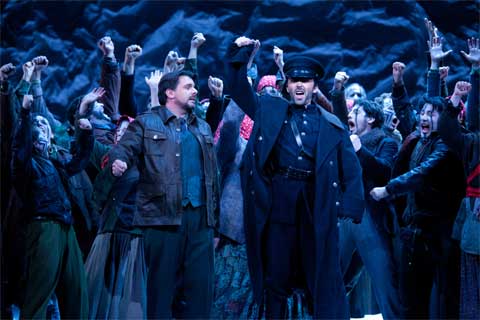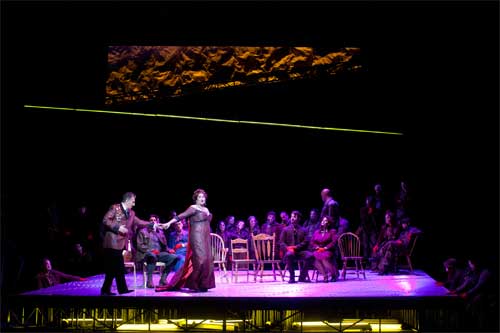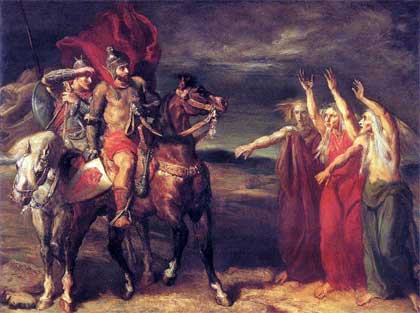Opera by Giuseppi Verdi
Libretto by Francesco Maria Piave and Andrea Maffei,
after William Shakespeare’s drama
Boston Lyric Opera
Shubert Theater
Boston, MA
November 4 – November 13, 2011
Conductor: David Angus
Stage Director: David Schweizer
Costume Designer: Nancy Leary, Set Designer: John Conklin, Lighting Designer: Robert Wierzel
With Daniel Sutin (Macbeth), Darren E. Stokes (Banquo), Carter Scott (Lady Macbeth), Richard Crawley (Macduff), John Irvin (Malcolm)

with members of the BLO Chorus
Photo: Erik Jacobs for Boston Lyric Opera © 2011
The story is the same as in Shakespeare’s play, just shortened way down.
Macbeth gets a prophecy from some witches that he is going to be king. This excites him, his wife even more, and before you know it they have realized the prophecy by killing off King Duncan and grasping the throne. The part of the witches’ prophecy they do not take as seriously – about Birnam Wood moving and all the rest – of course spells their doom.
Add a bit of Verdi choral background – very strange in this dramatic context, I must say – and there you have it.
This production is very interesting; because of its radical approach, it is likely to appeal to some and not to others. When I felt I had got with the program and a sense of the director’s vision, I enjoyed it.
David Schweizer, the stage director, has taken a nineteenth century opera based on an Elizabethan play and turned it into a twentieth century political performance piece, in modern neo-fascist dress. There is a lot of striking stagecraft – plenty of neon – in bright white and striking yellow – and puppets and mannequins galore. There are also all kinds of stage backgrounds that descend from above, providing abstract grids and other structural elements that support the staging. It is very stimulating visually.

Photo: Erik Jacobs for Boston Lyric Opera © 2011
But what to do with all of those chorus people? The action of Macbeth is limited, as we know from the play, to a few significant characters and there is not too much room in it for a gang. Shakespeare’s tragedy gains its power from its intense privacy, set within a political context.
But, here, Schweizer offers an interesting interpretation, which suggests something Brechtian; the chorus, which starts out seeming like an odd anachronism, becomes a forceful piece of the scenery, like a downtrodden populace should. And, here, in tune within a month of the fall of Khadafy, is a tale very much like it – of vain ascent to power, the tragic end that follows, and the pronounced role of the populace that brings it about.
One comes in expecting traditional Verdi and leaves with a sense of something new and offbeat. Unlike the latest development in the Metropolitan Opera’s excellent evolution of dramatic direction – which tends heavily towards style and sleekness – this production is unwieldy and collage-like in what I found to be a compelling way. The Met’s new production of Verdi’s Don Carlo was great because of its elegant abstraction of traditional staging. This production is forceful for its energetic and boisterous concatenations of images and improvisations. Totally different approaches, both with merit.

What, for me, started out feeling like an unsettling foisting of modern, anarchically inclined, staging on nineteenth century operatic music came to feel like something new and morphed, like performance art that still embodies an opera, but adds a new dimension to it. The chorus, initially seeming inertly present, came to feel ominous and significantly looming. After I saw all of those people crawling around on stage, I thought of the famously populated, dynamically amoeba-like scenes from Brecht’s and Weill’s operas or from classic stage performances of The Living Theater.
The orchestra was notably good and the musical direction by David Angus most capable.
The two central singers were decent, and warmed up nicely after what seemed like a strained opening. Daniel Sutin (Macbeth) had a wonderful solo near the end.
Darren E. Stokes (Banquo) had a satisfyingly rich voice.
The tenor Richard Crawley, who sang Macduff, did not have a big part, but his voice was strikingly good, which the audience duly acknowledged during the bows.
– BADMan
Leave a Reply